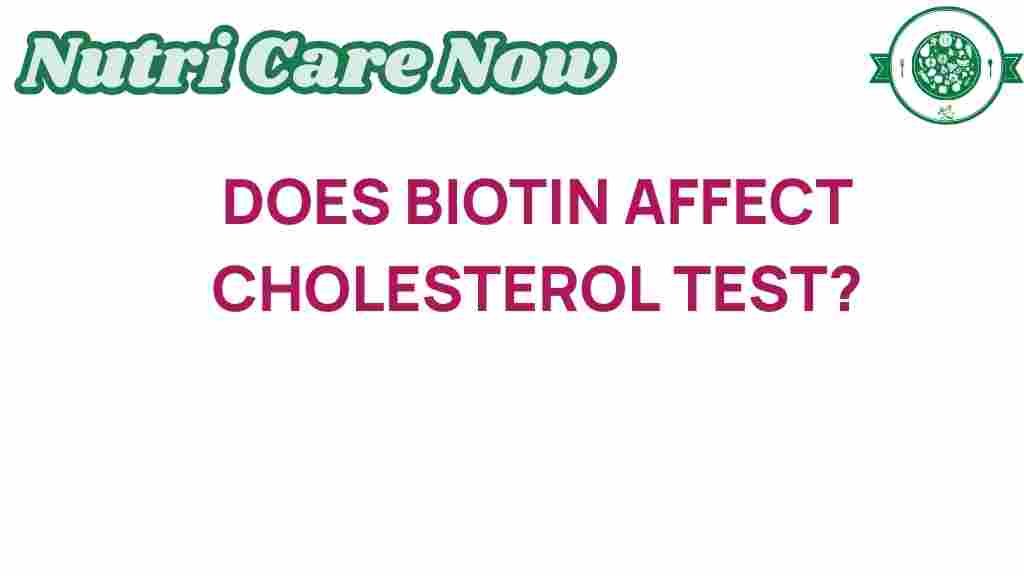Biotin, Cholesterol, and Health: The Surprising Impact on Testing
In recent years, biotin has gained popularity as a supplement known for its benefits in promoting healthy hair, skin, and nails. However, what many people may not realize is that biotin can significantly affect cholesterol testing and overall health. This article will explore the relationship between biotin, cholesterol, and testing, and how it impacts nutritional supplementation and medical advice.
Understanding Biotin and Its Role in Health
Biotin, also known as vitamin B7, is a water-soluble vitamin that plays a crucial role in several metabolic processes. It helps convert food into energy and is important for the health of our skin, hair, and nails. Biotin is naturally found in a variety of foods, including:
- Egg yolks
- Nuts and seeds
- Legumes
- Whole grains
- Meat and fish
Given its benefits, many individuals turn to biotin supplementation to improve their health. However, the implications of high-dose biotin supplementation on cholesterol testing can be surprising.
The Impact of Biotin on Cholesterol Testing
Recent research has shown that biotin can interfere with certain laboratory tests, particularly those measuring cholesterol levels. This interference occurs because many cholesterol tests utilize biotin-streptavidin technology. High levels of biotin in the bloodstream can lead to inaccurate results, causing potential misdiagnosis or inappropriate treatment.
How Biotin Affects Blood Tests
When a patient undergoes blood tests for cholesterol levels, laboratories often use assays that rely on the binding of biotin to streptavidin. If a person has taken high doses of biotin supplements, it can saturate the assay and lead to falsely low or undetectable cholesterol levels. This misrepresentation can have several consequences:
- Misdiagnosis: A false reading may suggest that a patient has low cholesterol, which could lead to inadequate treatment for cardiovascular risk.
- Unnecessary Anxiety: Patients may be led to believe they have a health issue when, in fact, their cholesterol levels are normal.
- Inappropriate Treatment: Clinicians may prescribe medications or lifestyle changes based on erroneous test results.
Step-by-Step Process for Accurate Cholesterol Testing
To ensure accurate cholesterol testing, follow these steps:
- Inform Your Healthcare Provider: Always tell your doctor if you are taking biotin supplements, especially at high doses.
- Timing of Supplementation: If possible, stop taking biotin supplements at least 48 hours before your blood test to reduce the risk of interference.
- Follow Pre-Test Guidelines: Adhere to any fasting requirements and other pre-test instructions provided by your healthcare provider.
- Request a Different Testing Method: If you are taking high doses of biotin and require cholesterol testing, discuss alternative testing methods with your healthcare provider.
Troubleshooting Biotin-Related Issues in Testing
If you suspect that biotin supplementation has affected your cholesterol test results, consider the following troubleshooting tips:
- Re-Test: Schedule a follow-up blood test after discontinuing biotin supplementation for a sufficient period.
- Check Other Labs: Some laboratories may use different testing technologies that are less susceptible to biotin interference. Ask your doctor for more information.
- Review Your Supplements: Ensure that your biotin supplements are not excessively dosed. The average recommended daily intake is around 30 mcg for adults.
The Importance of Medical Advice
When it comes to health and supplementation, always seek medical advice from a qualified healthcare professional. They can provide personalized recommendations based on your specific health needs and conditions. This advice is particularly important for individuals considering biotin supplementation for cosmetic reasons, as it may lead to unintended consequences on health markers like cholesterol.
Biotin is a valuable vitamin that supports various aspects of health, particularly for skin, hair, and nails. However, its impact on cholesterol testing cannot be overlooked. High doses of biotin can lead to inaccurate cholesterol test results, which can have serious implications for diagnosis and treatment. By understanding the effects of biotin on blood tests and following the steps for accurate testing, individuals can better manage their health and ensure they receive appropriate medical care.
As always, consult with healthcare professionals regarding supplementation and testing. Nutrition is a vital component of health, and maintaining balanced vitamin intake is essential for overall well-being. If you’re interested in learning more about vitamins and their effects on health, consider exploring additional resources on nutrition.
This article is in the category Health and created by NutriCareNow Team

1 thought on “The Surprising Impact of Biotin on Cholesterol Testing”